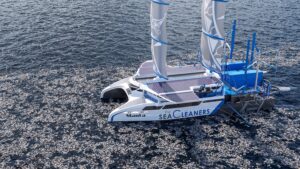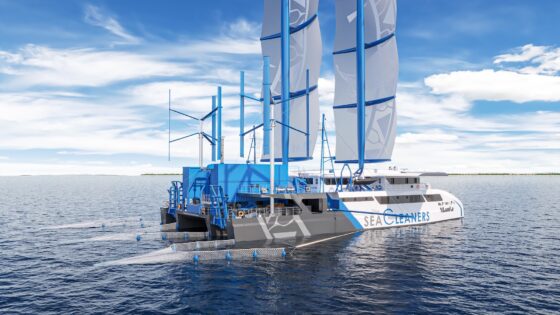
Waste sailship awarded Approval in Principle

The Manta, a sailship that collects floating plastic waste, has been awarded an Approval in Principle (AiP) by testing and certification firm Bureau Veritas.
The Manta, which can collect and repurpose floating plastic waste in areas of high marine litter concentration, is due to set sail at the end of 2025. The vessel was developed by Manta Innovation, the engineering arm of the NGO The SeaCleaners, which was founded in 2016 by French-Swiss explorer Yvan Bourgnon. The project was finalised with the support of naval architects at Ship-ST in France and LMG Marin in Norway.
The innovative vessel aims to help address the issue of marine plastic pollution in the coastal waters of most affected countries and near the estuaries of major rivers, with minimal environmental footprint.
At 56m long, 26m wide and 62m high, the Manta will be equipped with an on-board factory including a waste-to-energy conversion unit. The company says the vessel will be the first concentrated ecology and technology factory ship capable of collecting and processing floating ocean waste before it gets fragmented, starts to drift and penetrates the marine ecosystem in the long term.

“Marine plastic pollution is a global ecological disaster which requires urgent action now both on land and at sea,” says Bourgnon. “We are grateful that the Manta was awarded the AiP from Bureau Veritas Marine & Offshore. This represents a major milestone for us and shows the solidity of our approach to tackling plastic pollution as we are about to enter a new development phase of the Manta with the upcoming launch of the call for tenders to shipyards.
“More than 45,000 hours of study and development, involving over 60 engineers, technicians and researchers have led to this endorsement. It gives ourselves and our current and future partners confidence to look at the next steps.”
The Manta will be powered by a combination of renewable energy technologies to minimise its carbon footprint and, The SeaCleaners says, achieve 50-75 per cent energy autonomy. It will also serve as a scientific laboratory for the observation, analysis and understanding of ocean plastic pollution, and as an educational platform open to the public.
Bureau Veritas reviewed the overall structure, stability, and security plans of the Manta, based on risk mitigation around new technologies and requirements.
Laurent Leblanc, senior vice president of technical and operations at Bureau Veritas Marine & Offshore, says: “At Bureau Veritas Marine & Offshore, we share a drive to leave the maritime world in a better place than we found it. Bringing our expertise to pioneering projects, such as the Manta, is at the core of who we are and what we do. We help our clients to navigate challenges, providing practical advice. We look forward to the next phase of the Manta.”
